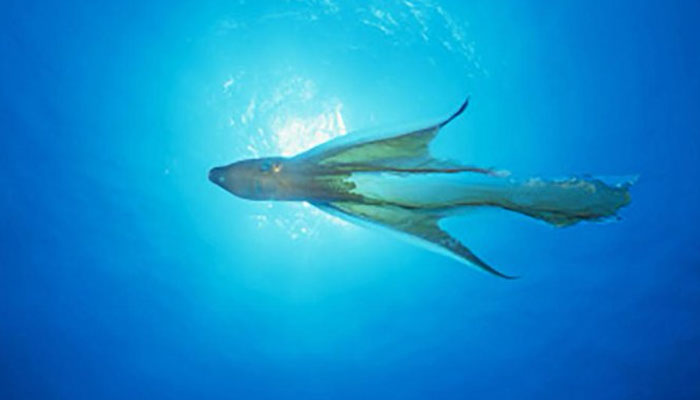Blanket octopus spotted for first time in Pakistani waters
In a rare occurrence, fishermen trained by the World Wide Fund for Nature-Pakistan (WWF-Pakistan) have spotted three specimens of blanket octopus from different locations along the Sindh and Balochistan coast this week.
According to a statement issued by the WWF-Pakistan, a 0.8-metre-long blanket octopus was spotted by Saeed Badshah from offshore waters of Balochistan on Saturday, December 7. This was the first live authentic report of this octopus species from the Pakistani waters, the statement added. While fishing 45 nautical miles south of Ormara, the fishermen caught the octopus in their gill net. Considering it a new and rare find, they released it safely back into the water.
The second specimen was reported by Ameer Rehman and was caught about 103 nautical miles southwest of Ghora Bari, Sindh on December 8, Sunday. This one-metre-long specimen was also released back into water, the statement said. Another fisherman, Hasnat Khan, who was also trained by the WWF-Pakistan, caught a blanket octopus about 92 nautical miles southwest of Cape Monz at the confluence of Sindh and Balochistan on December 9, Monday. This octopus was about 0.8 metre long and was released immediately.
The fishermen trained by the WWF-Pakistan have also released turtles, whales, dolphins, whale sharks, sunfish and other animals back into waters in the past.
WWF-Pakistan Technical Adviser Muhammad Moazzam Khan in a statement said that the particular species of octopus was found in warm areas of the world such as Indian Ocean, Pacific and Atlantic. “This was never reported in Pakistani waters,” he said, adding that during the last week, various fishermen came across the species in the sea in Sindh and Balochistan. “This is a new addition to Pakistan’s biodiversity,” he said.
Khan explained that the blanket octopuses (Tremoctopus violaceus) are oceanic cephalopods, which are found in surface to mid-waters in subtropical and tropical oceans. They are known as blanket octopus because of their long, transparent web that connects the dorsal and dorsolateral arms of adult females.
The female blanket octopuses can reach two metres in length, whereas, the males are much smaller around 2.4 cm. Khan also shared that when threatened, the female octopus unfurls her large net-like membranes that spread out and billow in the water, largely increasing her apparent size, avoiding predation by fish and other animals. These animals also use ink to intimidate potential predators. The WWF-Pakistan technical adviser said the species’ addition to Pakistan’s marine animals could be a subject of future research. “This also indicates that our coastal areas are very rich in natural resources.”
Dr Babar Khan, the WWF-Pakistan Sindh and Balochistan technical head, considered the occurrence of blanket octopuses an important addition to the cephalopod fauna of Pakistan. “Although this is the first record from Pakistani waters, but it can help find the remaining population of this unique cephalopod,” he remarked.
-
 Hong Kong Court Sentences Media Tycoon Jimmy Lai To 20-years: Full List Of Charges Explained
Hong Kong Court Sentences Media Tycoon Jimmy Lai To 20-years: Full List Of Charges Explained -
 Coffee Reduces Cancer Risk, Research Suggests
Coffee Reduces Cancer Risk, Research Suggests -
 Katie Price Defends Marriage To Lee Andrews After Receiving Multiple Warnings
Katie Price Defends Marriage To Lee Andrews After Receiving Multiple Warnings -
 Seahawks Super Bowl Victory Parade 2026: Schedule, Route & Seattle Celebration Plans
Seahawks Super Bowl Victory Parade 2026: Schedule, Route & Seattle Celebration Plans -
 Keto Diet Emerges As Key To Alzheimer's Cure
Keto Diet Emerges As Key To Alzheimer's Cure -
 Chris Brown Reacts To Bad Bunny's Super Bowl LX Halftime Performance
Chris Brown Reacts To Bad Bunny's Super Bowl LX Halftime Performance -
 Trump Passes Verdict On Bad Bunny’s Super Bowl Halftime Show
Trump Passes Verdict On Bad Bunny’s Super Bowl Halftime Show -
 Super Bowl 2026 Live: Seahawks Defeat Patriots 29-13 To Win Super Bowl LX
Super Bowl 2026 Live: Seahawks Defeat Patriots 29-13 To Win Super Bowl LX -
 Kim Kardashian And Lewis Hamilton Make First Public Appearance As A Couple At Super Bowl 2026
Kim Kardashian And Lewis Hamilton Make First Public Appearance As A Couple At Super Bowl 2026 -
 Romeo And Cruz Beckham Subtly Roast Brooklyn With New Family Tattoos
Romeo And Cruz Beckham Subtly Roast Brooklyn With New Family Tattoos -
 Meghan Markle Called Out For Unturthful Comment About Queen Curtsy
Meghan Markle Called Out For Unturthful Comment About Queen Curtsy -
 Bad Bunny Headlines Super Bowl With Hits, Dancers And Celebrity Guests
Bad Bunny Headlines Super Bowl With Hits, Dancers And Celebrity Guests -
 Insiders Weigh In On Kim Kardashian And Lewis Hamilton's Relationship
Insiders Weigh In On Kim Kardashian And Lewis Hamilton's Relationship -
 Prince William, Kate Middleton Private Time At Posh French Location Laid Bare
Prince William, Kate Middleton Private Time At Posh French Location Laid Bare -
 Stefon Diggs Family Explained: How Many Children The Patriots Star Has And With Whom
Stefon Diggs Family Explained: How Many Children The Patriots Star Has And With Whom -
 ‘Narcissist’ Andrew Still Feels ‘invincible’ After Exile
‘Narcissist’ Andrew Still Feels ‘invincible’ After Exile




